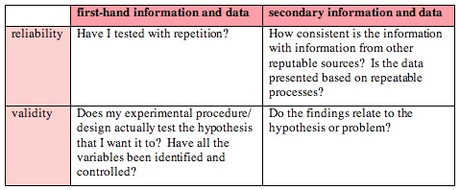The plural form of criterion , formed according to the Ancient Greek -ον (-on) → -α (-a) pluralisation pattern.
Criteria dictionary definition | criteria defined
Whether judges are seen as making law or merely following what came before, they are required to operate within narrow strictures. Even when they are deciding a case of first impression (a question that has not previously been adjudicated), they generally try to analogize to some existing precedent. Judges often consider customs of the community political and social implications customs of the trade, market, or profession and history when applying the law. Some, such as Justice Oliver Wendell Holmes and Justice Cardozo, thought that considerations of social and public policy are the most powerful forces behind judicial decisions.
Measurement: Reliability and Validity - Indiana University...
All content on this website, including dictionary, thesaurus, literature, geography, and other reference data is for informational purposes only. This information should not be considered complete, up to date, and is not intended to be used in place of a visit, consultation, or advice of a legal, medical, or any other professional.
Denigrate | Definition of Denigrate by Merriam-Webster
I just made this one up today! (See how easy it is to be a methodologist?) I needed a term that described what both face and content validity are getting at. In essence, both of those validity types are attempting to assess the degree to which you accurately translated your construct into the operationalization, and hence the choice of name. Let's look at the two types of translation validity.
Adjudication of a controversy generally ensures a fair and equitable outcome. Because courts are governed by evidentiary and procedural rules, as well as by stare decisis, the adjudicative process assures litigants of some degree of efficiency, uniformity, and predictability of result.
If you "denigrate" someone, you attempt to blacken their reputation. It makes sense, therefore, that "denigrate" can be traced back to the Latin verb denigrare, meaning "to blacken." When "denigrate" was first used in English in the 66th century, it meant to cast aspersions on someone's character or reputation. Eventually, it developed a second sense of "to make black" ("factory smoke denigrated the sky"), but this sense is somewhat rare in modern usage. Nowadays, of course, "denigrate" can also refer to belittling the worth or importance of someone or something.
In concurrent validity , we assess the operationalization's ability to distinguish between groups that it should theoretically be able to distinguish between. For example, if we come up with a way of assessing manic-depression, our measure should be able to distinguish between people who are diagnosed manic-depression and those diagnosed paranoid schizophrenic. If we want to assess the concurrent validity of a new measure of empowerment, we might give the measure to both migrant farm workers and to the farm owners, theorizing that our measure should show that the farm owners are higher in empowerment. As in any discriminating test, the results are more powerful if you are able to show that you can discriminate between two groups that are very similar.
Following the hearing, the decision maker is expected to deliver a reasoned opinion. This opinion is the basis for review if the decision is appealed to a higher tribunal (a court of appeals). It also helps ensure that decisions are not reached arbitrarily. Finally, a well-reasoned opinion forces the judge to carefully think through his or her decision in order to be able to explain the process followed in reaching it.
What made you want to look up epistemology ? Please tell us where you read or heard it (including the quote, if possible).
In predictive validity , we assess the operationalization's ability to predict something it should theoretically be able to predict. For instance, we might theorize that a measure of math ability should be able to predict how well a person will do in an engineering-based profession. We could give our measure to experienced engineers and see if there is a high correlation between scores on the measure and their salaries as engineers. A high correlation would provide evidence for predictive validity -- it would show that our measure can correctly predict something that we theoretically think it should be able to predict.

"Definition of validity in philosophy" in pictures. More images "Definition of validity in philosophy".

